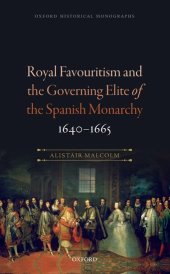 Neuerscheinungen 2016Stand: 2020-02-01 |
Schnellsuche
ISBN/Stichwort/Autor
|
Herderstraße 10
10625 Berlin
Tel.: 030 315 714 16
Fax 030 315 714 14
info@buchspektrum.de |

Alistair Malcolm
Royal Favouritism and the Governing Elite of the Spanish Monarchy, 1640-1665
2016. 320 S. 223 mm
Verlag/Jahr: OXFORD UNIVERSITY PRESS 2016
ISBN: 0-19-879190-9 (0198791909)
Neue ISBN: 978-0-19-879190-4 (9780198791904)
Preis und Lieferzeit: Bitte klicken
A chronological and thematic analysis of the Spanish government during the mid-seventeenth century, focussing on Philip IV´s bestowal of favour on his favourite, don Luis Méndez de Haro. Alistair Malcolm shows the insecurity of Haro´s position as he sought to justify his regime by managing a prestigious and expensive foreign policy.
Royal Favouritism and the Governing Elite of the Spanish Monarchy, 1640-1665 presents a study of the later years of the reign of Philip IV from the perspective of his favourite (valido), don Luis Méndez de Haro, and of the other ministers who helped govern the Spanish Habsburg Monarchy. It offers a positive vision of a period that is often seen as one of failure and decline. Unlike his predecessors, Haro exercised the favour that he enjoyed in
a discreet way, acting as a perfect courtier and honest broker between the king and his aristocratic subjects. Nevertheless, Alistair Malcolm also argues that the presence of a royal favourite at the head of the government of Spain amounted to a major problem. The king´s delegation of his authority to a single nobleman was
considered by many to have been incompatible with good kingship, and Philip IV was himself very uneasy about failing in his responsibilities as a ruler. Haro was thus in a highly insecure situation, and sought to justify his regime by organizing the management of a prestigious and expensive foreign policy. In this context, the eventual conclusion of the very honourable peace with France in 1659 is shown to have been as much the result of the independent actions of other ministers as it was of a
royal favourite very reluctantly brought to the negotiating table at the Pyrenees. By conclusion, the quite sudden collapse of Spanish European hegemony after Haro´s death in 1661 is represented as a delayed reaction to the repercussions of a flawed system of government.
Haro´s elusive nature means he has not come to the fore in later historiography, and Malcolm´s study rectifies this situation. ... What Malcolm does to fill in the gaps is to combine an impressive grasp of mid-seventeenth-century Spanish aristocracy, its intermarriages, feuds, and pretentions of royal ancestry with an equally impressive depiction of the ideas shaping this aristocracy. ... The fact that Luis de Haro was not quite the archetypal favorite in the same way as Lerma, Olivares, Buckingham, or Richelieu makes Malcolm´s study even more valuable. A different kind of favorite, like Haro, shows the many nuances and forms early modern government could take and adds to our understanding of a fascinating and complex phenomenon. Fabian Persson, Renaissance Quarterly
Alistair Malcolm studied History at the Universities of St Andrews and Oxford, and is currently a lecturer at the University of Limerick. He is a specialist in the cultural and political history of Spain during its Golden Age. His current projects are a general study of the effects of court favouritism on policy-making in Spain during the seventeenth century, and a book of documents in translation to assist in the teaching of early modern Spanish history for
undergraduates. His approach to the writing of history is one intended to appeal to specialists and general readers alike.


